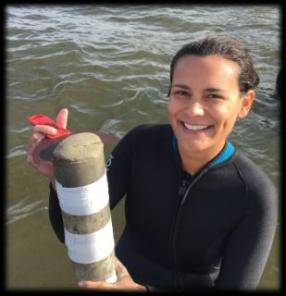PhD Students
 Angelica Zamora-Duran
Angelica Zamora-Duran
Doctoral Student
Research Summary: My research focuses on combining paleoecological analyses with modern ecological data to assess how coral-reef ecosystems respond to changes in climate. Paleoecological analyses provide an opportunity to extract predictive trends from past relationships between environmental parameters and ecosystem change, allowing us to project the responses of ecosystems to anthropogenic impacts. Foraminifera have been used as indicators of environmental conditions past and present. In my master’s-thesis research, I used Foraminifera as bioindicators of ecosystem health in the Indian River Lagoon, Florida. Now I am studying the assemblages of Foraminifera in cores of coral-reef frameworks from the Pacific coast of Panamá. By using ecological, geochemical, and paleoenvironmental tools I aim to identify long-term relationships between reef health and environmental conditions.
Education:
• M.S. Florida Institute of Technology, 2016, Oceanography/Biological Oceanography
• B.A. University of Virginia, 2010, Biology
Victor Rodriguez-Ruano
Doctoral Student
My research focuses on estimating how environmental factors influence the capacity for coral reefs to grow and sustain important geo-ecological functions in the face of climate change. These functions include coastal protection from storms, commercially important fisheries, and eco-tourism. By quantifying geological and ecological processes that add and subtract calcium carbonate to a reef, I develop carbonate budgets that determine whether a reef is experiencing net growth or erosion through time. Knowing how quickly a reef is growing or being destroyed helps us predict whether their geo-ecological functions will persist or become obsolete in the face of rapid sea-level rise and increasing sea-surface temperatures.
Education:
B.S. Florida Institute of Technology, 2018, Biological Sciences – Marine
Michael Gigliotti
Doctoral Student
My research concerns the biogeographical shifts of nearshore crab species in the western Atlantic Ocean in response to climate change. Ocean temperatures are expected to increase to unprecedented levels (as well as become more variable) by the end of the century, and nearshore environments are among the most threatened ecosystems under future climate regimes. Crabs are critical components of nearshore-benthic food webs and have been shown to significantly alter the structure of coastal assemblages, but early life stages that rely on shallow environments as nurseries for development are particularly vulnerable to significant fluctuations in environmental parameters. I have compared the physiological limits of different near-shore crab species when exposed to prolonged hypoxia and higher temperatures, and I am currently analyzing historical ranges through time while uncovering possible biases in the data. Potential future work may consider the predicted variability caused by climate change by looking at the effects of cold shocks on nearshore species.
Education:
B.S. Cornell University, 2017, Biology
Undergraduate Students
Christian Pagel
Undergraduate Student
My research focuses on analyzing coral-reef cores from Christmas Island. These cores are from the Holocene Epoch and date back from about 5000 years old to 1200 years old. The purpose of analyzing these cores is to determine whether there is a ~2000-year hiatus in reef growth that has been recorded in other parts of the Pacific. Determining if this hiatus was happening in other regions could be the key to determining why this hiatus was happening in the first place. The palaeoecological analysis of these cores provides valuable insight into what ocean conditions were like thousands of years ago and can help us predict the future responses of coral reefs.
Yates Carrier
Undergraduate Student
My research is focused on the effects of cold shocks on food-consumption rates and activity levels of the green clinging crab, Mithraculus sculptus. M. sculptus act as grazers and scavengers on corals reefs and help control algae cover on the reef. With climate change, the Jet stream has begun to dip into lower latitudes than its traditional path. These lower variations in the trajectory of the Jet stream have created colder than normal temperatures in Florida. Using recorded, Jet-stream related cold snap events as models, I will be mimicking these temperature drops in a controlled environment. I will also be measuring M. sculptus’ consumption rates and activity levels during the cold shocks. Hopefully this research will give a better insight into how climate change is affecting algae control on coral reefs in Florida and the Caribbean.

 Give to Florida Tech
Give to Florida Tech 